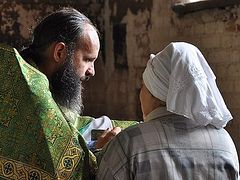The week of the Prodigal Son is a good opportunity to talk about the difficulties faced by parents’ communication with teenagers. What makes it so difficult to talk to children as they grow up? What can be done? We discussed these questions with Father Dimitry Shishkin, father of two daughters and rector of the Church of the Protecting Veil of the Theotokos in the village of Pochtovoye in the Crimean district of Bakhchisaray.
—Fr. Dimitry, what makes it so difficult to communicate with teenage children at times?
—There are many reasons, but I think the main one is that at this age, children consider it very important that they find the answers to their questions themselves. In this period, any authority is questioned.
Everything hinges on the issue of human freedom, the basis of religious and Church life. Freedom is something that no one can take away from us. Even God dares not violate human freedom.
It’s the teenage years when a person first tries to grasp everything they have been hearing since childhood, but only ever understood externally. But when you want to come to the knowledge of the truth yourself, a new time of risks comes. Teenagers often become extreme in their judgments and begin to reject the authorities they previously respected.
—They also begin to be rude and talk back, often for no apparent reason.
—At this age they begin to be rude and talk back precisely because they perceive any moral lesson as an encroachment on their personal freedom. Their aggression arises because they don’t know how to explain themselves any other way. Now they want to come to their own judgments on their own, through their personal experience, however painful and difficult this might be. This applies to lofty religious concepts, things and principles as well.
—Is there something that parents can do, in your opinion, to minimize the pain of poor communication, to reduce the rudeness and mistrust on the part of their teenage children?
—Back when I tried to insist and demand that my daughter do her duties and behave properly, I suddenly discovered that there comes a time when nothing works anymore. There is no longer any sense in strictness and moralizing. It’s comparable to what happens when a bird releases a chick from its nest. It’s a very risky moment, but there is no other way. This is how mature children learn to fly.
At some point, we need to step back and make room for the freedom that we are talking about. We need to pray more and try to support our teenage child in simple, human ways. Kind human communication makes it easier to convey to them what is important for you.
In some sense, now you need to learn to communicate with your child on an equal footing. You can continue to insist on your role as instructor, mentor or teacher (which you, as a father, ought to have every right to do), but this no longer works. And, as Elder Paisios the Hagiorite used to say, at some point we need to put the screwdriver right into God’s hands, so that He Himself can “tighten up” whatever has come loose. We must trust God more, because far too often we are too self-confident, even in our imaginary piety.
Of course, we must continue to talk to the teenage child and not give up teaching him, but there must be more trust in God.
—Speaking of which, the father in the Parable of the Prodigal Son let his son go, but first supplied him with everything he needed.
—Yes, he didn’t restrain him. He didn’t handcuff him to the radiator or anything like that. This was a huge risk for the father, and the reason for his heartache. But he let his son go, so that he could return on his own later. This is the mystery of human freedom, something without which the Orthodox faith and living, human communication with God cannot exist.
—Teenagers brought up in churchgoing families often stop going to church. In your view, is there something that can or should be done in advance to minimize this risk?
—Indeed, this is yet another risk in this period: teenagers often leave the Church and stop attending services. This happens because they need their own experience. We have already mentioned how young birds learn to fly. This is a time when we need to pray harder for our children. And we must trust God, because if we truly trust Him, He will never abandon us.
Elder Paisios used to say that if you tried to raise your child in the Orthodox faith, if you firmly planted in his soul the concepts of the Law of God, the Commandments and Divine Truth, then, trust me, the Lord won’t abandon him. You have done what depended on you, and then begins the place and time for human freedom to manifest. Sooner or later, a person must begin to make decisions and bear responsibility himself. Parents bear responsibility up until a certain point, but a time comes when most of the responsibility passes on to their child.
And this part of our freedom is likewise part of our personal responsibility before God.
—How would you define the age at which a person receives greater responsibility? How old should they be—thirteen, fifteen, seventeen?
—People are different. Some people mature by the age of twelve or thirteen. I remember examples—role models of my childhood. Valentin Kotik and Vladimir Dubinin1 were teenagers during the Second World War, but what heroic deeds they performed! What sacrifices they made, deliberately! What wisdom, courage and maturity they displayed! And nowadays, you can see people thirty and older who are completely infantile.
Therefore, it is difficult to say at what age a person becomes independent, even partially. It usually happens in their teenage years, tentatively speaking between 13 and 17. In my opinion, the most important thing is to maintain warmth in your communication with teenagers at this time.
—Is it worth limiting teenagers’ time on the internet? Do you consider the internet, limitless and uncontrollable, to be an evil?
—I disagree that the internet in itself is evil. I can give an example to illustrate this. In the mid-1980s, I was a big reader. I would go to the library, request a book, and sometimes I was told that it was in the archives, or they couldn’t find it, so I should just “come back tomorrow.” Now I can find good, useful and correct information online: for services, sermons and reading Patristic texts. I can read online about St. John Damascene, for example, and at the same time see pictures of where he lived. When and where could I have done this before? For our generation, this is a luxury.
The question is how you use it. Indeed, our children often misuse the internet and its possibilities.
—Today many people can’t get their teenage children to pick up a book, and they spend their time online in social networks or watching videos. They aren’t reading books online.
—This is exactly what I meant: the problem is not the internet, but that our teenagers have been instilled with the wrong attitude towards the internet. They don’t know how to use it properly, and don’t have the right spiritual or moral fiber and have no inner spiritual or moral foundations. As a result, they develop “clip thinking,” which keeps them from getting into anything deeply.
We should explain these hazards to children as much as possible, and positively influence the teenager’s desire to find himself in this world.
—Do you think it is worth it to limit the amount of time that teenagers spend online or with their devices? An hour a day maximum, for example?
—Yes, I think this is right. But again, families are different, teenagers and circumstances vary. It’s impossible to come up with a single rule. If a teenager is involved in something, constructing some machine, or writing a research paper and needs information as part of his creative work, then why should we set strict limits? If he’s able to use this tool, let him work. But if he’s just wasting time online then, of course, we should limit him until he reaches the age when our limits are no longer effective.
To summarize our short talk, I think the most important thing is to pray for your loved ones and maintain real human communication with them. With God’s help, it’s possible to endure and overcome everything, find a common language, to understand, help and support each other. But if in following all the rules, you lose the warmth in your communication with others, then your “rightness” will stick with you and you won’t be able to help anyone, just like the Pharisee. This is what we should remember.





